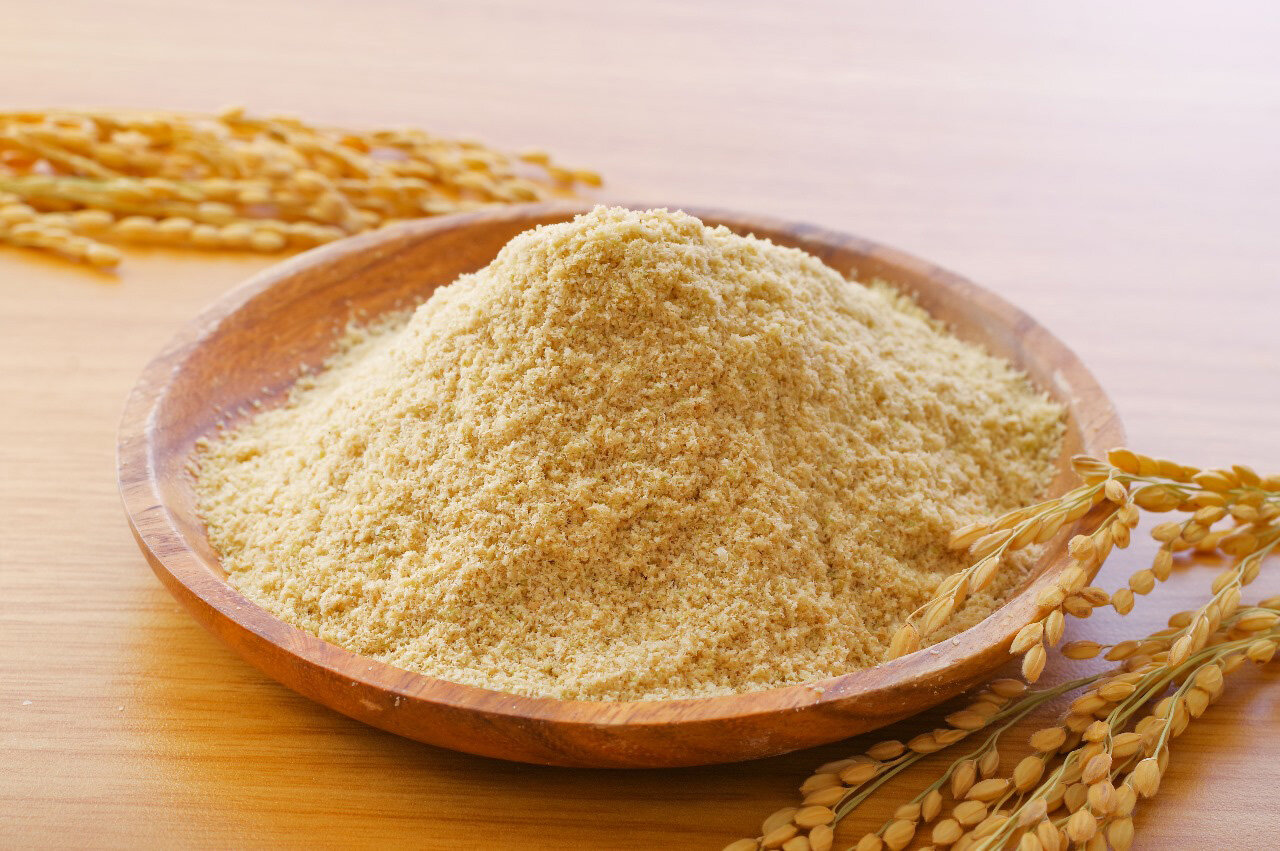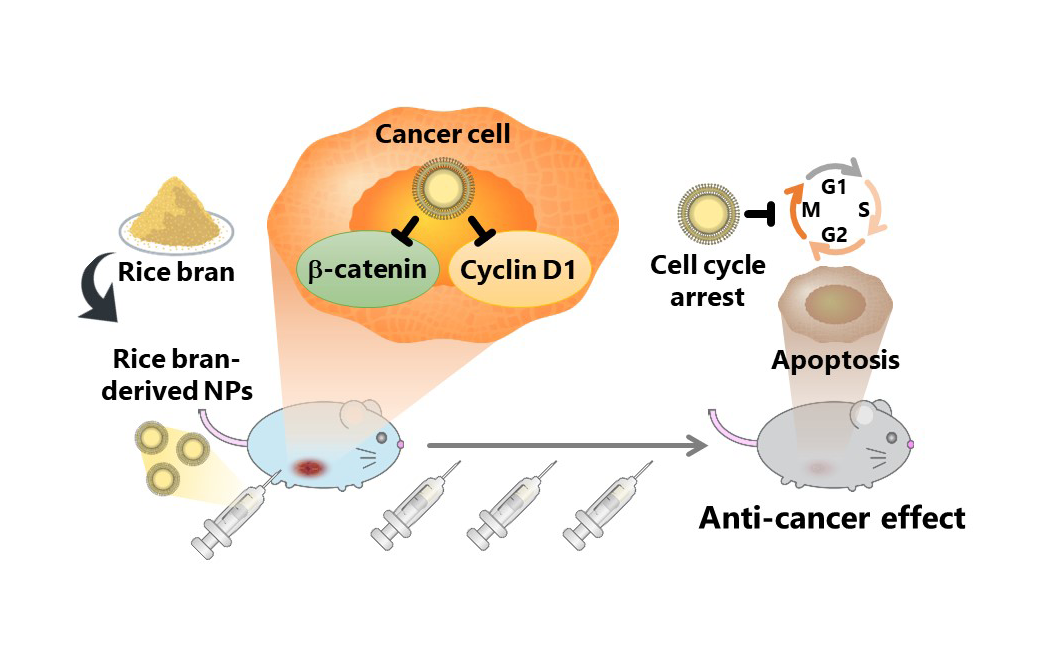2024.04.22 Monday
Breakthrough Rice Bran Nanoparticles Show Promise as Affordable and Targeted Anticancer Agent
Researchers discover that nanoparticles derived from rice bran are both effective and safe for the treatment of cancer

Several types of conventional cancer therapies, such as radiotherapy or chemotherapy, destroy healthy cells along with cancer cells. In advanced stages of cancer, tissue loss from treatments can be substantial and even fatal. Cutting-edge cancer therapies that employ nanoparticles can specifically target cancer cells, sparing healthy tissue. Recent studies have demonstrated that plant-derived nanoparticles (pdNPs) that have therapeutic effects can be an effective alternative to traditional cancer treatments. However, no pdNPs have been approved as anticancer therapeutic agents till date.
Rice bran is a byproduct generated during rice refining process that has limited utility and low commercial value. However, it contains several compounds with anticancer properties, such as γ-oryzanol and γ-tocotrienol. To explore these therapeutic properties of rice bran, a team of researchers led by Professor Makiya Nishikawa from Tokyo University of Science (TUS) in Japan developed nanoparticles from rice bran and tested their effectiveness in mice models. Their study, published in Volume 22 of Journal of Nanobiotechnology on 16 March 2024, was co-authored by Dr. Daisuke Sasaki, Ms. Hinako Suzuki, Associate Professor Kosuke Kusamori, and Assistant Professor Shoko Itakura from TUS.
"In recent years, an increasing number of new drug modalities are being developed. At the same time, development costs associated with novel therapies have increased dramatically, contributing to the burden of medical expenses. To address this issue, we used rice bran, an industrial waste with anticancer properties, to develop nanoparticles," explains Prof. Nishikawa.
The study evaluated the anticancer effects of rice bran-derived nanoparticles (rbNPs), which were obtained by processing and purifying a suspension of Koshihikari rice bran in water. When a cancer cell line named colon26 was treated with rbNPs, cell division was arrested and programmed cell death was induced, indicating strong anticancer effects of the nanoparticles. The observed anticancer activity of rbNPs can be attributed to γ-tocotrienol and γ-oryzanol, that are easily taken up by cancer cells resulting in cell cycle arrest and programmed cell death. Additionally, rbNPs reduced the expression of proteins, such as β-catenin (a protein associated with Wnt signaling pathway involved in cell proliferation) and cyclin D1, which are known to promote cancer recurrence and metastases. Moreover, the rbNPs reduced the expression of β-catenin only in colon26 cells without affecting the non-cancerous cells.
"A key concern in the context of pdNPs is their low pharmacological activity compared to pharmaceutical drugs. However, rbNPs exhibited higher anticancer activity than DOXIL®, a liposomal pharmaceutical formulation of doxorubicin. Additionally, doxorubicin is cytotoxic to both cancer cells and non-cancerous cells, whereas rbNPs are specifically cytotoxic to cancer cells, suggesting that rbNPs are safer than doxorubicin," highlights Prof. Nishikawa.
To confirm the anticancer properties of rbNPs in the living body, the researchers injected rbNPs into mice having aggressive adenocarcinoma in their peritoneal cavity (enclosed by the diaphragm, abdominal muscles, and pelvis and houses organs like intestines, liver, and kidneys). They observed significant suppression of tumor growth with no adverse effects on the mice. Additionally, the rbNPs significantly inhibited metastatic growth of murine melanoma B16-BL6 cells in a lung metastasis mouse model.
Rice bran has several attributes that make it an excellent source of therapeutic pdNPs. Firstly, it is economic as compared to many other sources of pdNPs. Nearly 40% of the rice bran is discarded in Japan, providing a readily available source of raw material. Secondly, the preparation efficiency of rbNPs is higher than that of previously reported pdNPs. Besides being practical and safe as an anticancer therapeutic, the physicochemical properties of rbNPs are very stable. However, a few parameters, such as establishment of separation technologies at the pharmaceutical level, assessing production process control parameters, and evaluation of efficacy and safety in human cancer cell lines and xenograft animal models, must be investigated prior to clinical trials in humans.
In conclusion, rice bran, an agricultural waste product, is a source of therapeutic pdNPs that are affordable, effective, and safe, and has the potential to revolutionize cancer treatment in the future.
"By establishing a manufacturing method for rice bran nanoparticles with stable quality and confirming their safety and effectiveness, we can develop drugs for cancer treatment that are sustainable, eco-friendly, and affordable. Consequently, we may be able to help more cancer patients maintain good physical and mental health after treatment," concludes Prof. Nishikawa.

Image title: Anticancer effect of rice bran-derived nanoparticles (rbNPs) in mouse model.
Image caption: Researchers at TUS develop rbNPs that arrest cell cycle and suppress the expression of proteins, such as β-catenin and cyclin D1, that promote metastasis, specifically in cancer cells. They also induce apoptosis of cancer cells, thereby displaying significant anticancer effect.
Image credit: Prof. Nishikawa from TUS, Japan
License type: Original content
Usage restrictions: Cannot be reused without permission
Reference
| Title of original paper | : | Development of rice bran-derived nanoparticles with excellent anti-cancer activity and their application for peritoneal dissemination |
| Journal | : | Journal of Nanobiotechnology |
| DOI | : | 10.1186/s12951-024-02381-z |
About The Tokyo University of Science
Tokyo University of Science (TUS) is a well-known and respected university, and the largest science-specialized private research university in Japan, with four campuses in central Tokyo and its suburbs and in Hokkaido. Established in 1881, the university has continually contributed to Japan's development in science through inculcating the love for science in researchers, technicians, and educators.
With a mission of "Creating science and technology for the harmonious development of nature, human beings, and society," TUS has undertaken a wide range of research from basic to applied science. TUS has embraced a multidisciplinary approach to research and undertaken intensive study in some of today's most vital fields. TUS is a meritocracy where the best in science is recognized and nurtured. It is the only private university in Japan that has produced a Nobel Prize winner and the only private university in Asia to produce Nobel Prize winners within the natural sciences field.
■
Tokyo University of Science(About TUS)

About Professor Makiya Nishikawa
from Tokyo University of Science
Dr. Makiya Nishikawa is a Professor at the Faculty of Pharmaceutical Sciences, Tokyo University of Science. His research interests include biopharmaceutics, pharmacokinetics, and drug delivery systems, among many others. Prof. Nishikawa is the recipient of the PSJ Award for Young Scientists and the 17th Japan DDS Society Nagai Award. He has published nearly 300 scientific papers, close to 30 books, and has 2 patents to his credit.
Laboratory website 
Official TUS website 
Funding information
M. Nishikawa received research funding from Ono Pharmaceutical Co., Ltd.

